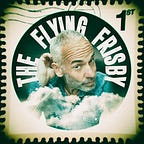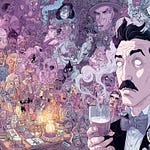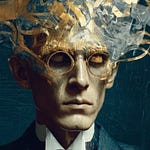I’ve had it beaten into me from an early age how important it is to write clearly and simply. My father, himself a writer, drilled it into me. In my teenage years and into my 20s, we used to work together like mad on things I had written, trimming them down, rephrasing, editing, and he would always talk about the importance of clarity, as he taught me the craft of writing. “Make it easy for the reader,” he would say.
As I’ve said many times, the discipline of comedy also forces clarity. If the audience doesn’t understand, they don’t laugh and you die.
But in academia and across the financial world, and probably elsewhere, no such discipline applies. In fact, it often pays not to be clear. In the case of finance, if you can obfuscate a little, you are less likely to be caught out or have things thrown back at you. Former Chair of the Federal Reserve, Alan Greenspan, who could speak in total gobbledygook if he needed, called what he did “purposeful obfuscation”. How right was George Orwell, another clear speech advocate, when he said “the great enemy of clear language is insincerity”.
In the case of academia, unreadable sentences and long words can make you look cleverer than you actually are.
There are so many books that have become wildly popular, which I’ve tried to read, and found unreadable. Thomas Pickety’s Capital In The 21st Century, for example. In the past I’ve tried and failed with James Joyce, Umberto Eco (except for The Name of the Rose), Gabriel Garcia Marquez, Kurt Vonnegut, Herman Melville, Salman Rushdie, Joseph Heller, Stephen Hawking, Ayn Rand, Mary Shelley, Virginia Woolf, Marcel Proust and more. Let’s be honest I’ve tried and failed to complete Homer, Dante and the Bible (King James version), as well. Maybe I lack persistence, but a large part of me thinks, “if you haven’t made the effort, why should I?”
Picketty’s book sold millions of copies, but the stats from Amazon showed that hardly anyone actually finished it. It became one of those books that was cool to talk about having read, without anyone actually heaving read it. I settled for the Wikipedia entry - and I’m not even sure I finished that.
I’m currently working on a new book about gold and so I find myself reading a lot more than usual, as I research. Here is something, I’ve observed. Often you will stumble across a website where the writer has put some history or science or economics in beautifully clear and simple language. To do that takes effort. Such websites can become the most fantastic reference points. But sometimes because something is so simply written, I somehow think that by citing it - as I should - it doesn’t reflect very well on me. But cite some unreadable academic trove and that makes me look clever - even if I haven’t actually read it.
As people who have read my books will know, I am pretty scrupulous about my citations. But if I find myself drawn to the temptation, for sure others will be too. People will cite the stuff they haven’t actually read, and not cite the stuff they have read. The unclear, pompous, badly written stuff with long words and endless sentences ends up getting the recognition, while the better, simpler stuff, where the writer has worked harder to make it easier for the reader, gets overlooked and even plagiarised. It’s the opposite of a virtuous circle.
It’s another symptom of the midwit-dominated society in which we live, I suppose. The flannel gets the acclaim, the clear and simple stuff at either end of the bell curve not so much.
We all think that we are not getting the credit we deserve. But I do sometimes wonder if perhaps I had worked less hard to make my stuff readable, I would have got more recognition - especially from the establishment (whatever that is). I’ve had so much stuff plagiarised over the years: books and articles, jokes and stand-up routines, even a film I helped write. It leaves a very sour taste in the mouth. But I don’t think I’ll ever bring myself to deliberately write unreadable stuff. I’m too programmed to try and keep things clear. Ah, the crosses we have to bear.
On reading this, my girlfriend said I need to read the book The Four Agreements. Those agreements are: "Be impeccable with your word", "Do not take anything personally", "Do not make assumptions" and "Always do your best". She may have a point.
It had better be clearly written …
Live shows coming up
If you have not seen my lecture with funny bits about gold, we have two more dates in London lined up for Feb 14 and 15.
And I am taking my musical comedy show, An Evening of Curious Songs, on a mini tour in the spring with dates in London, Somerset, Hampshire, Surrey and Essex. This is a really fun show.
Here are the dates and places.
London, Crazy Coqs, W1. Wednesday March 20th. On sale now.
Bordon, Hampshire. Saturday March 23. On sale now.
Guildford, Surrey. Friday April 5. On sale now.
Bath, Somerset. Saturday April 6. On sale now.
Southend, Essex . Sunday April 14. On sale now.
Buying gold?
Interested in protecting your wealth in these extraordinary times? Then be sure to own some gold bullion. I use The Pure Gold Company, whether you are taking delivery or storing online. Premiums are low, quality of service is high, you can deal with a human being. I have an affiliation deal with them.













